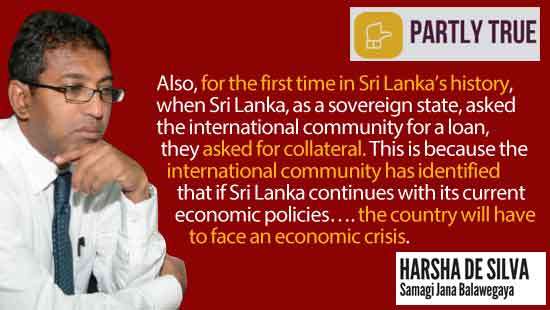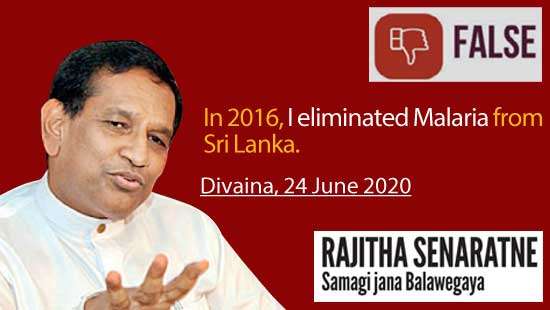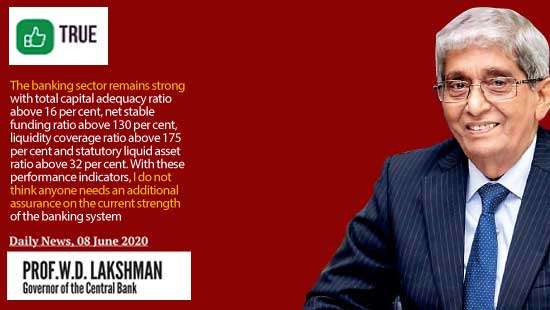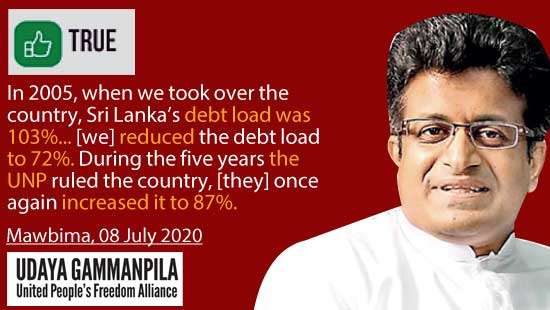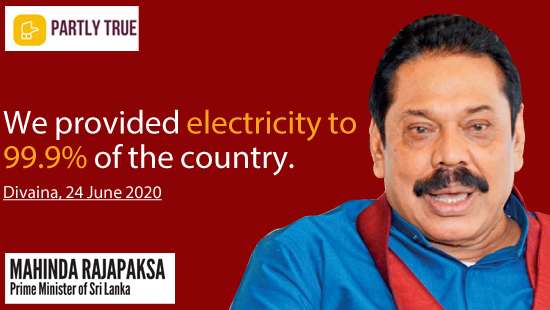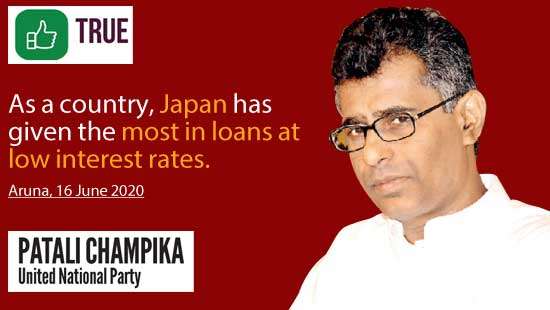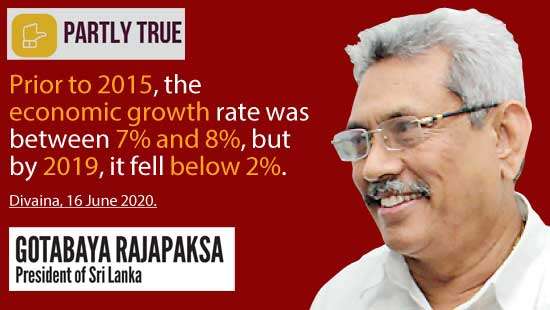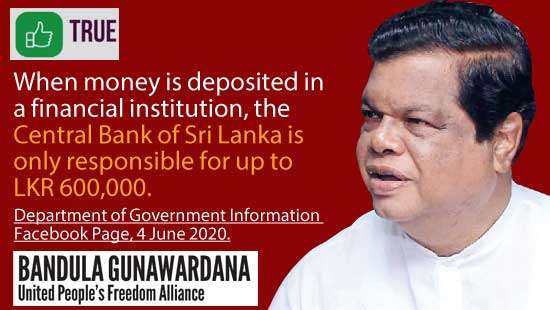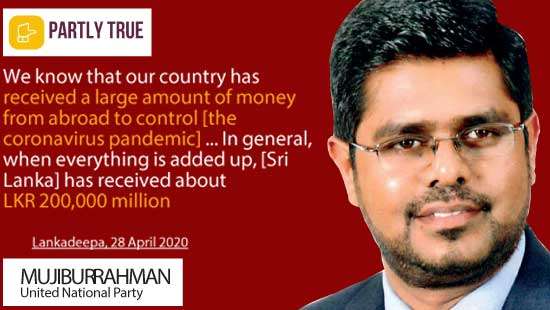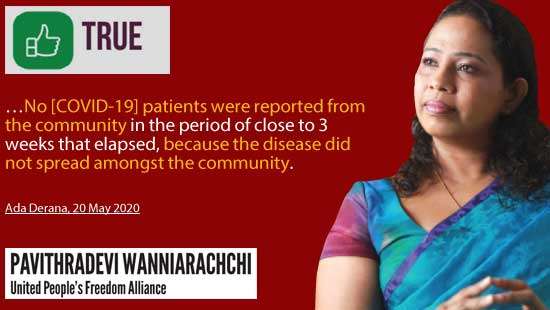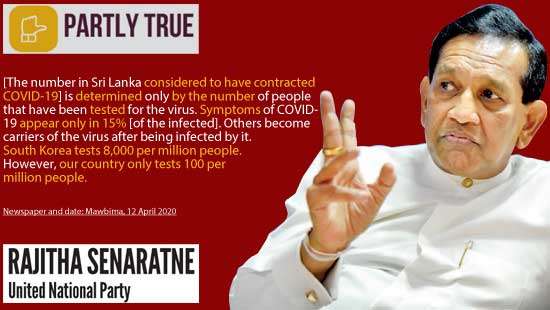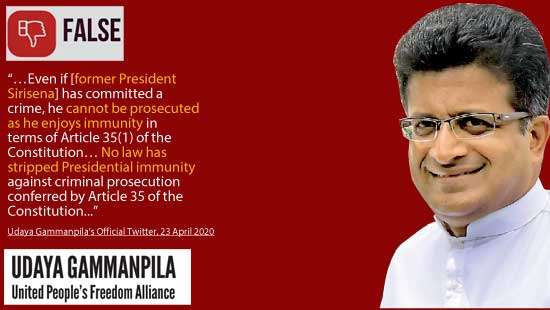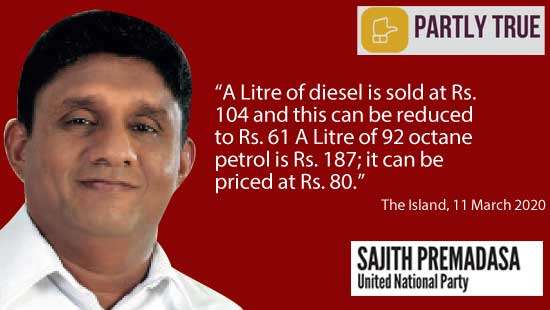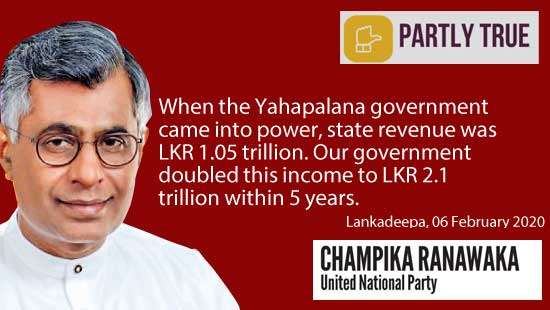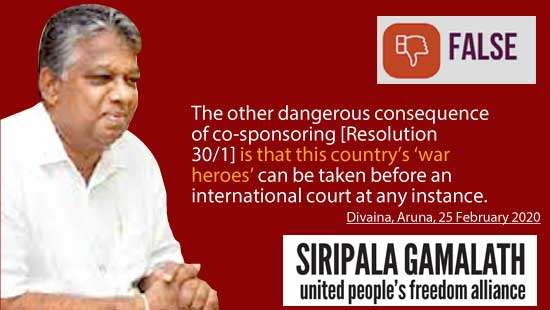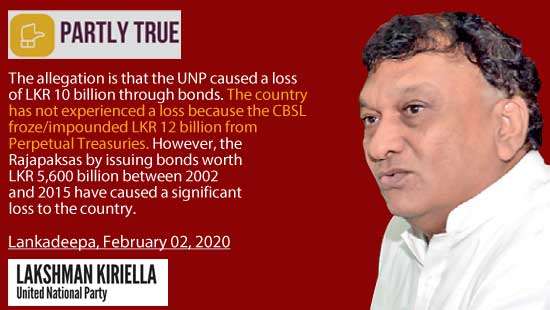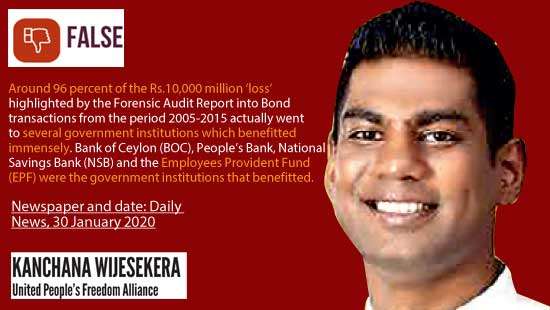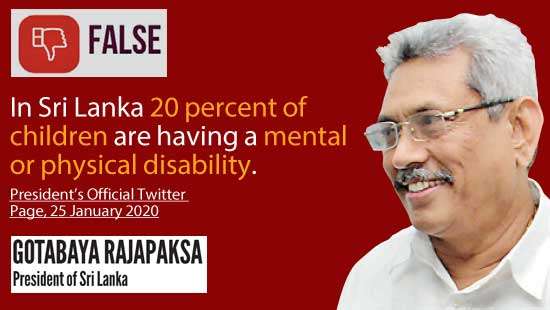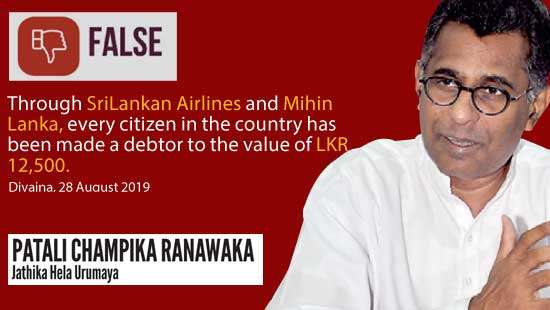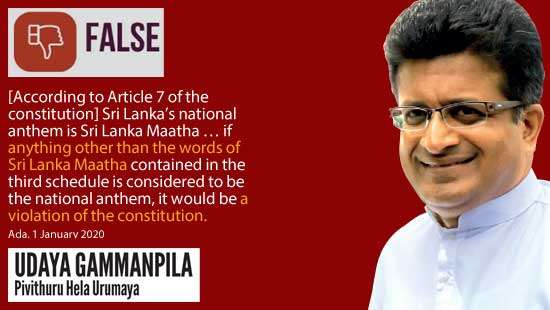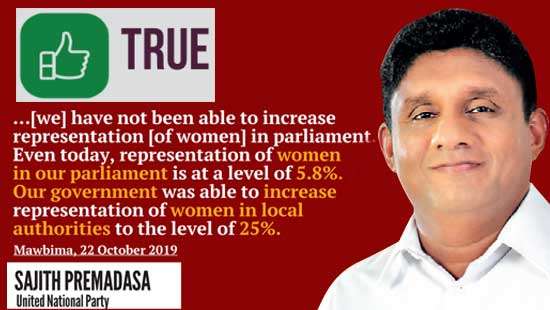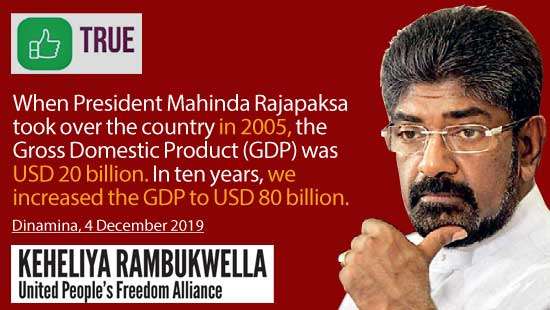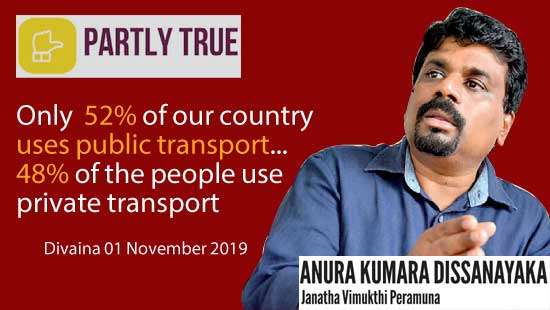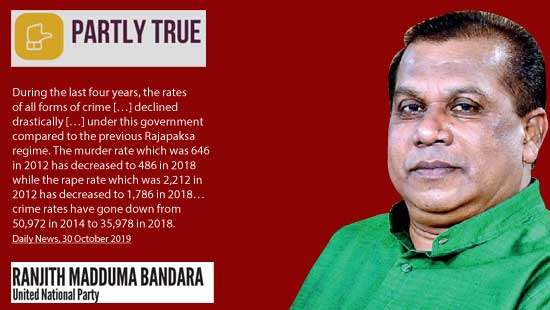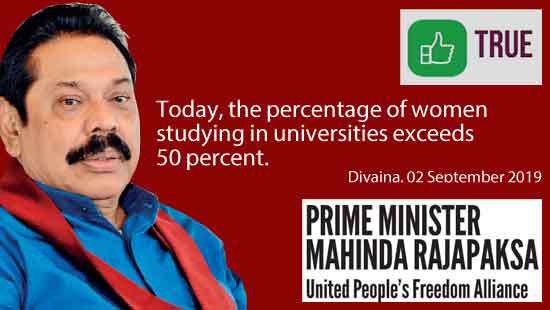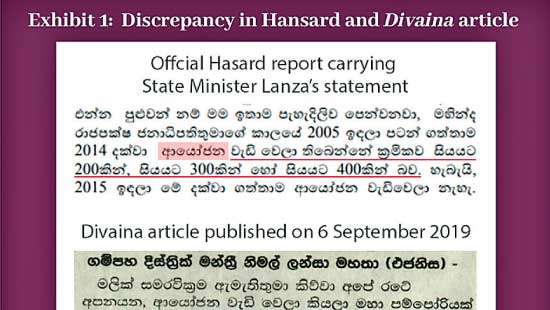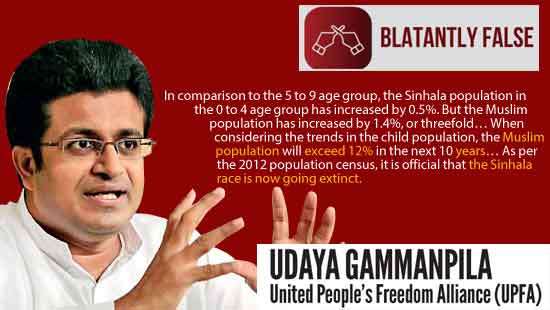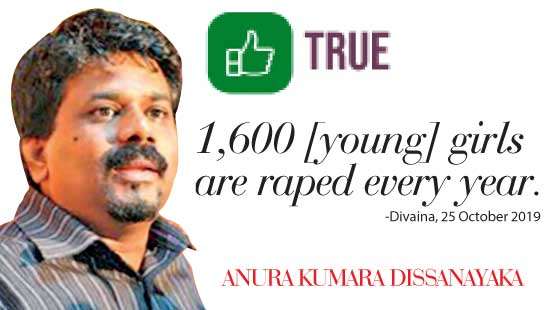slide 1
Governor’s claim on strength of the banking system can be banked on
30 Jul 2020
 0
0
To evaluate Governor of the Central Bank of Sri Lanka (CBSL) W.D. Lakshman’s claim, FactCheck consulted the set of principles developed by the Bank for International Settlements (BIS)—an international organisation that serves and supports central banks in their pursuit of monetary and financial stability—to assess the risk taken on by global and domestic banks. Sri Lankan domestic ban
Prime Minister Mahinda Rajapaksa: over-energetic on electricity access
16 Jul 2020
 3
3
On 24 June 2020, Divaina reported Prime Minister Mahinda Rajapaksa’s above claim that his government succeeded in achieving effectively universal access to electricity (99.9% access). To evaluate this claim, FactCheck consulted data from the annual reports of the Central Bank of Sri Lanka from 2004 to 2019. In 2004—prior to the Sri Lanka Freedom Party (SLFP) forming government—74.9% of the population had access to electricity. By 2014—the final
President Gotabaya Rajapaksa overclaims change in economic growth
02 Jul 2020
 2
2
FactCheck evaluated the president’s claim in terms of real GDP growth in the post-war period, using data from the 2019 National Accounts Estimates of the Department of Census and Statistics and the Annual Report of the Central Bank of Sri Lanka 2019. From 2010 to 2014, the real GDP growth rate reported averaged 6.78%, which is a little below the 7-8% claimed. This results from the GDP growth being higher than 7% for 3 years in 2010-12, and unde
Co-cabinet Spokesperson Bandula Gunawardana: right on private deposit security
25 Jun 2020
 1
1
To evaluate this claim, FactCheck consulted the Monetary Law Act, Finance Companies Act and Sri Lanka Deposit Insurance Scheme Regulations. The legislative framework for deposit insurance in Sri Lanka is established by Sections 32A t
Former Health Minister Senaratne correctly diagnoses underestimation of Covid-19 cases but overstates extent
21 May 2020
 0
0
Former Health Minister Rajitha Senaratne made the overall claim that the number of people reported as having Covid-19 in Sri Lanka is a significant underestimate due to three reasons. This FactCheck evaluates the former minister’s overall claim by evaluating the specific reasons and facts provided in support of the overall claim.
Udaya Gammanpila Gives President Sirisena False Immunity Boost
14 May 2020
 1
1
Former MP Udaya Gammanpila made this statement as part of a series of tweets with reference to the ability to prosecute former President Maithripala Sirisena for any alleged crime in relation to the Easter Sunday attacks.
MP Ranawaka overestimates revenue growth under the yahapalana government
30 Apr 2020
 4
4
FactCheck evaluated the MP’s claim using data from the Annual Report 2018 and the Weekly Economic Indicators published by the CBSL. At the time the MP made the statement, data for 2019 was only available for the first nine months (see Exhibit 1).
GMOA on relative rate of COVID-19 case growth in Sri Lanka: mistaken on both data and trajectory
03 Apr 2020
 1
1
In comparing Sri Lanka’s trajectory with that of Italy, the GMOA makes reference to the first ‘local’ case detected. This is a standard distinction made in counting cases, where those that contracted the virus outside the country and brough
MP Kiriella overreaches on recovery of bond transactions losses
12 Mar 2020
 0
0
MP Kiriella argues that the estimated loss of LKR 10 billion arising from irregular bond transactions post-January 2015 should not be considered a loss. His argument is based on over LKR 12 billion of counter-party assets being frozen in response to investigations. He contrasts this with the losses estimated for the 2002-2014 period where there is no asset freeze to support the recovery of losses.
MP Kanchana Wijesekera misidentifies beneficiaries of bond transaction losses
05 Mar 2020
 0
0
To assess this claim FactCheck consulted Report 1 (of the 5 reports) from the forensic audit at the Central Bank of Sri Lanka. It investigates the issuance of treasury bonds from January 2002 to 28 February 201
In Sri Lanka 20 percent of children are having a mental or physical disability Gotabaya Rajapaksa Twitter
27 Feb 2020
 6
6
President misinformed on disabilityTo evaluate the president’s statement on Twitter made after the opening of the Ayati Centre, FactCheck consulted the most recent Population and Housing Census (PHC) compiled in 2011 by the Department of Census and Statistics (DCAS). The PHC uses a commonly understood definition of disability as mental or physical impairments that cause daily difficulty in at least one of six areas. The PHC finds the prevalence t
MP Gammanpila out of tune on national anthem
30 Jan 2020
 5
5
MP Udaya Gammanpila claims that treating the national anthem as existing in any language other than Sinhala is a violation of the constitution because Article 7 of the constitution gives the national anthem as “Sri Lanka Maatha” in Sinhala. To check this claim, FactCheck consulted the constitution. The officially published versions of the constitution contain the name and words of the national anthem in two languages—Sinhala and Tamil. In Sinhala
MP Premadasa correct on his representation of women in politics
24 Jan 2020
 1
1
MP Sajith Premadasa makes three claims: (1) representation of women in the current parliament is 5.8%; (2) the number of women in parliament has been low over time; and (3) the 2015- 2019 government increased representation of women in local authorities to the level of 25%.
Minister Rambukwella on past GDP growth: Correct but also misleading
16 Jan 2020
 1
1
Minister Keheliya Rambukwella’s figures present a fourfold increase in GDP during Mahinda Rajapaksa’s presidency. The minister is correct in the figures he cites. However, this fact check will go on to explain why stating GDP in USD instead of LKR could be misleading. FactCheck evaluated the claim using data from the Special Statistical Appendix of the Central Bank of Sri Lanka (CBSL) Annual Report 2018 and National Accounts Estimates of the Depa
MP Dissanayaka on public transport: Riding on Western Province data
09 Jan 2020
 0
0
To check this claim, FactCheck consulted the Urban Transport System Development Project for Colombo Metropolitan Region and Suburbs (CoMTrans) report published in 2014 which is publicly available on the Ministry of Transport website. The survey data used in this report is limited to the Western Province. CoMTrans reports the share of trips (not distance) that each mode of transport accounts for in the Western province. If the MP is referring to
MP Bandara partly overstates the reduction in crime
19 Dec 2019
 0
0
FactCheck assessed the MP’s claim using the latest data from the Grave Crimes Abstract (GCA) from the Sri Lanka Police and the Prison Statistics of Sri Lanka report 2019. Exhibit 1 shows that the numbers provided by the MP are mostly correct, barring some small deviations. The numbers compared are misleading, however, because he was claiming an improvement during the 2015-2018 period; but using two of the three reference points from 2012, instea
Prime Minister Mahinda Rajapaksa correct on the higher education of women
12 Dec 2019
 0
0
To check this claim, first we consulted the University Grants Commission (UGC) 2018 statistics on undergraduate enrolment in universities and higher educational institutions. This provides statistics only for institutions established under the Universities Act. No. 16 of 1978. There are a number of institutions, both government and private, that don’t fall within this Act.
Nimal Lanza misinterpreted by the press
07 Dec 2019
 0
0
On 5th December 2019, FactCheck published, in the Daily Mirror, a statement reported as being made by State Minister Nimal Lanza in the Divaina newspaper on 6 September 2019. FactCheck classified Minister Lanza’s statement as FALSE. It has been brought to our attention now, that the Minister’s statement was reported incorrectly in the press. In his statement, original
MP Gammanpila messes up the math on demographic change
28 Nov 2019
 5
5
In the above statement, MP Gammanpila makes two claims: that (i) the Muslim (Sri Lankan Moor) population will exceed 12% of the total population in the next 10 years (i.e. by 2029); and (ii) the Sinhala population is declining and is under threat of extinction by the rapid growth of the Muslim population. The MP’s claim is based on the growth of the
MP Weerawansa falsely attributes to the USA/MCC, plans for an east-west economic corridor published by his ministry in 2011.
14 Nov 2019
 3
3
The claim cited from last week has been often repeated by MP Wimal Weerawansa, including in parliament on July 31st, where he implies that the Millennium Challenge Corporation (MCC) of the United States has proposed an economic corridor in Sri Lanka from Colombo to Trincomalee.
MP Anura Kumara Dissanayaka correctly quotes statutory rape statistics
07 Nov 2019
 1
1
To assess this claim, we used data from the Grave Crimes Abstract (GCA) from the Sri Lanka Police. Since the MP specified “girls”, we considered reported cases of rape of women under 16, which is classified as statutory rape. GCA data records the number of statutory rape cases reported from 2015 to 2018 in a range from 1,438 to 1,686 per annum. The average reported cases of statutory rape during this period was 1,556. The MP’s claim of 1,600 ali

SL exits ’Restricted Default’ rating
07 Nov 2019
 1
1

SriLankan airlines hosts agents’ tour to Gan island
07 Nov 2019
 1
1

First Capital crowned as Brand of the Year at SLIM Brand Excellence 2024
07 Nov 2019
 1
1

Bitcoin surges past $100k for first time
07 Nov 2019
 1
1

USAID, CBL group to boost SL’s coconut industry
07 Nov 2019
 1
1

crisis spirals, Govt. extends deadline for imports till January 10
07 Nov 2019
 1
1

Suspect dies after collapsing in Chilaw Police custody
07 Nov 2019
 1
1

Dayasiri defends use of President’s Fund, rejects misuse allegations
07 Nov 2019
 1
1


